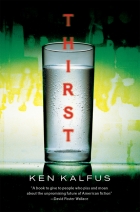Thirst
The first book by Ken Kalfus, a collection of short stories: Parisian sex museums, Third World deluges, existential dread and existential baseball. Newly reissued by Milkweed Editions.
- A New York Times Notable Book of the Year
- One of the Village Voice Literary Supplement’s 25 Favorite Books of the Year
- Salon.com Book Award
"Kalfus is one of those rare writers whose travels haven't colored his prose with cosmopolitan cynicism... He reminds us that sometimes the really significant truths are those found closest to home."
— Dwight Garner, The Village Voice
"A dazzling debut...With his amazingly eclectic story collection, Ken Kalfus emerges as a major literary talent...It's exhilarating to discover a young writer with so much range and so little self-consciousness about exploiting it."
— Laura Miller, Salon ("The Amazing Voices of Ken Kalfus")
"Kalfus veers between whimsical postmodern playfulness and a darker realism in the fourteen stories of his skilled, versatile first collection.... Ambitious and daring, with smart, fluid prose and an abundance of surprises."
— Publishers Weekly
"Throughout this collection, the door is open to such unsettling ambiguity; always a tantalizing ''perhaps'' is in play..... Ken Kalfus lights his stories with this fundamental strangeness. The displaced figures in Thirst drift through worlds that are at once astonishing and familiar. They'd like to wake up in their own beds after a good night's sleep, but even that blessing would, we suspect, have the word ''perhaps'' in it somewhere."
— Ron Carlson, The New York Times Book Review ("Invisible Malls, Imaginary Baseball: Anything is plausible in one or another of these short stories")
"An intelligent and playful collection of short stories that will move readers by engaging their sense of wonder and joy of exploration...Ken Kalfus resorts to fiction to accommodate what life can't accommodate - imaginary meanderings that the physical, phenomenological world makes impossible. He keeps contradictions and ambivalences in abeyance, forcing confrontation of possible and impossible worlds. He uses fiction, among other things, to address problems, without seeking to resolve them."
— Boston Book Review



